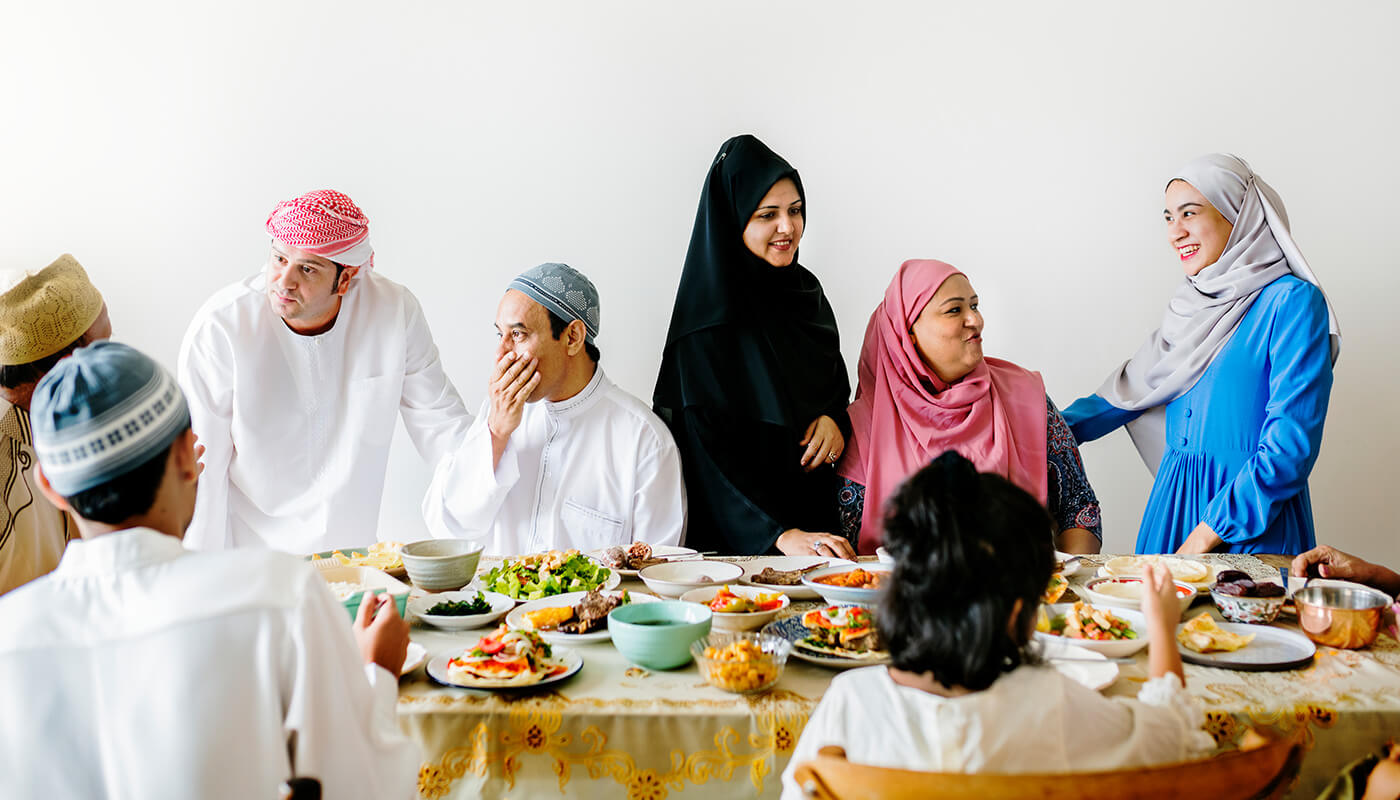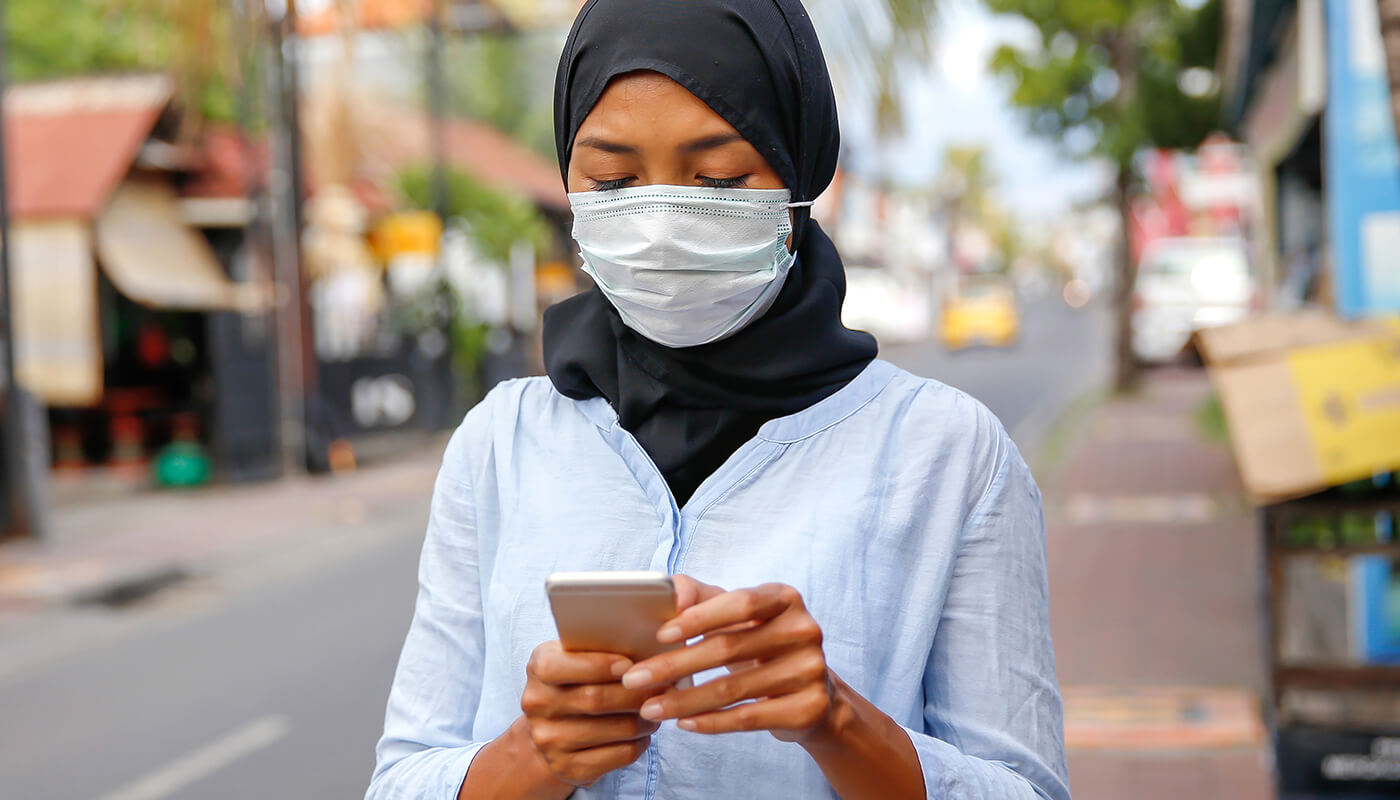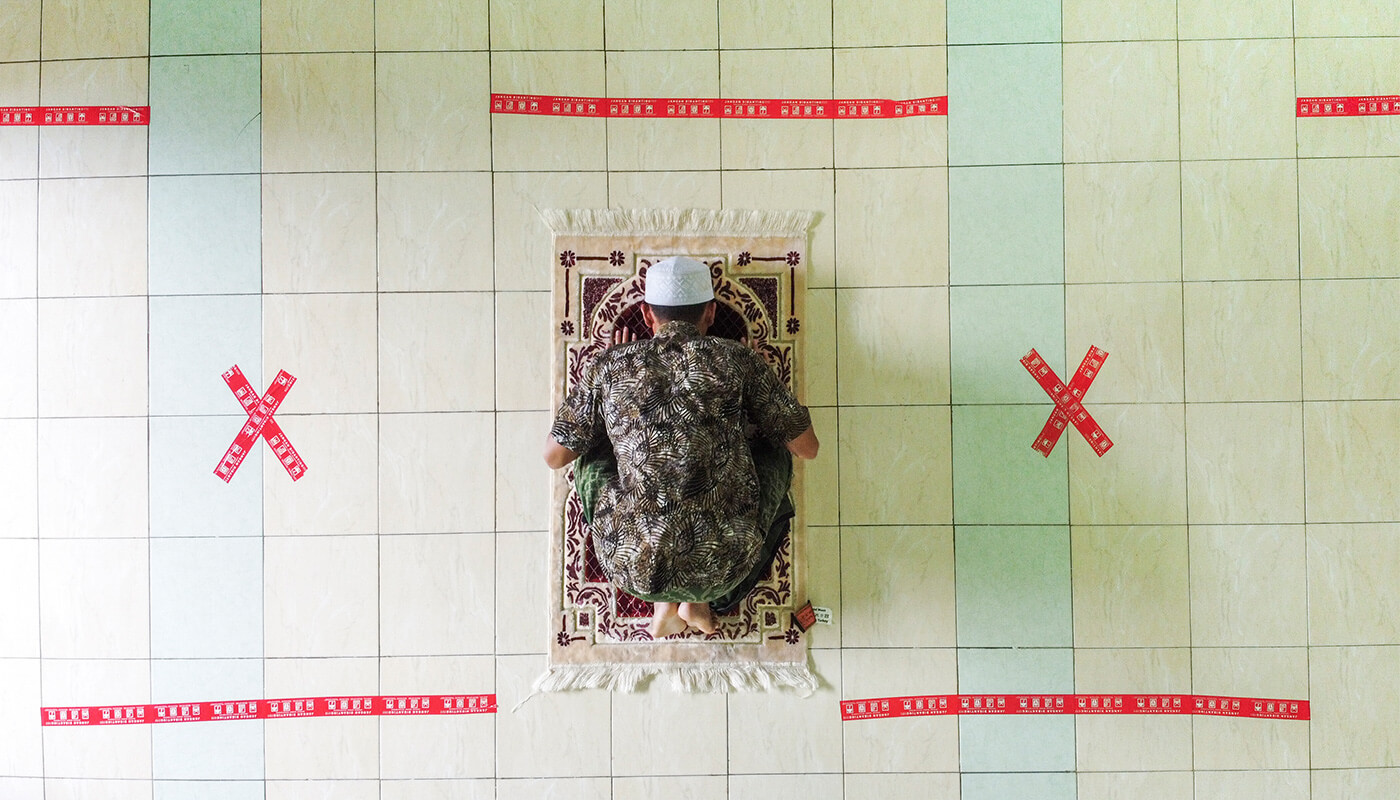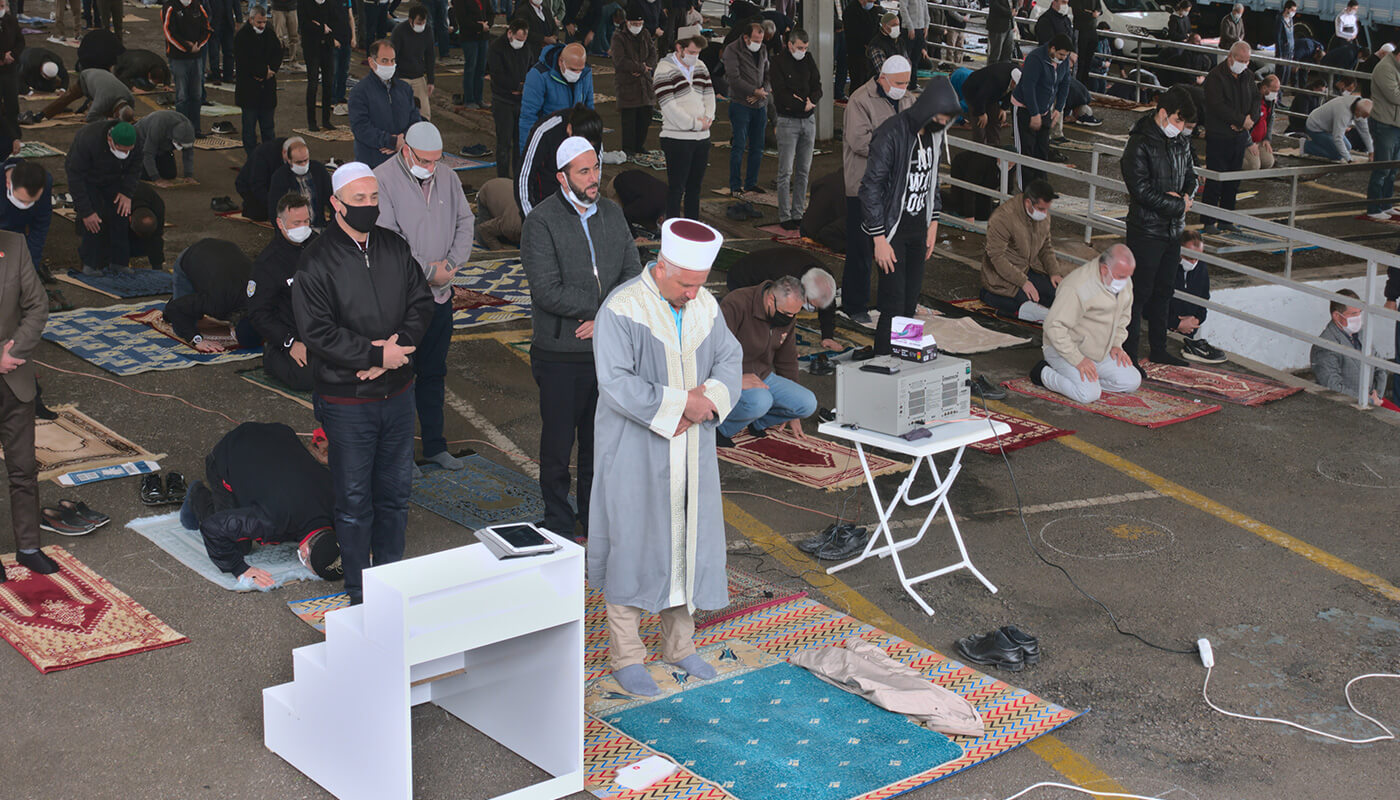Every year, billions of Muslims welcome the holy month of Ramadan with much zeal and delight. Ramadan is the symbol of connection with God. It promotes caring, sharing and collective solidarity with other Muslims. Gathering for prayers and sharing meals with loved ones while extending the blessings with those in need.
However, the COVID-19 pandemic has paralysed the whole world with extensive lockdowns and restrictions on gathering and mobility. The third wave of COVID has virtually stalled the world once again and has affected more than 128 million people worldwide. Like every year, Ramadan again brings excitement and caution with the complex plans for the COVID-19 vaccination drive.
A year ago, during Ramadan, religious leaders quickly planned virtual services and navigated carefully as the deadly pandemic was sweeping nations apart. Now comes the time to contemplate what we learnt during those hard times and utilise it to steer better and save lives while staying connected.

As people spent more time at home, they increased their reliance on digital media tremendously, particularly messaging and social media and video conferencing apps. A study on changes in digital communication during the global pandemic surveyed more than 1,300 US participants. There was a massive increase in digital communication where 43% of respondents used text messaging more often. That is followed by the 36% increase in voice calls, 35% in social media, and 30% in video calls. And interestingly, the study didn’t record work-related communications.
Another study investigated whether the use of digital communication technology for virtual meetings such as voice and video calls promoted the perception of social support. WHO and American Psychological Association listed potential increase of negative feelings among the masses such as loneliness, anxiety, anger, boredom, and irritability due to the strict social isolation.
Reduction of face-to-face interaction, uncertainty, and loss of freedom caused psychological consequences for people. Research published in Frontiers in Personality found that digital technology mitigated social distancing’s adverse effects during Italy’s lockdowns. Technology served as a support mechanism during these challenging times, which lowered the feelings of loneliness, anger and increased sense of belonging.
Data from another study revealed that media habits changed dramatically during the pandemic, with calling and messaging apps seeing a 40 per cent increase in usage.

Ramadan, by essence, is a communal celebration, going to mosques, praying, having iftars with family, friends, and volunteering for social causes to drive spiritual connection with God.
Though the COVID-19 pandemic has created a feeling of disconnect between people. Even in these difficult times, Muslims can follow the Prophet Muhammad’s guidelines of staying neat and clean, learn to maintain work-life harmony while staying at home, and pray with precautions. Will the use of sanitiser affect the fast? Or if getting the COVID-19 shot will break the fast?
Prayer is an essential part of the Ramadan experience. Mosques that usually are brimming with the faithful during the Ramadan month are practically closed around the globe. With the strict restriction on movement between countries and social distancing, limitations put a curb on the yearly celebrations.
In the United Kingdom, the Muslim Council of Britain advises around 2.6 million Islamic faithful to arrange and attend virtual iftars. Similarly, prompting clerics and imams to live stream the prayers and teachings online.
The Islamic Religious Council of Singapore issued a fatwa validating mosques’ closure as a precautionary and emergency measure to curb the pandemic’s spread. The Fatwa Committee declared it required the suspension of congregational prayer and Friday prayers during this pandemic situation.
Similarly, in partnership with the British Board of Scholars and Imams (BBSI), the Islamic Relief justified the closure of mosques during times of crisis and the safe adaptations to traditional Islamic burial practices. The Guidance on safe religious practice also offers spiritual counsel and consultation based on Islamic law and the medical understanding of the disease.
The stern lockdowns in the United States have been difficult for Muslims where many are opting for videoconferencing to replace in-person prayers and family meals.
As the pandemic challenges the human race, medical experts suggest regular and thorough handwashing and maintaining personal and public hygiene. Today’s medical guidelines are practically in sync with Islamic teachings. Cleanliness is half of faith; the Prophet Muhammad’s hygiene practices were highly acclaimed and recorded by historians. Health experts say these practices are effective in keeping disease and impurity at bay.
Ablution or wudu is a mandatory practice for all Muslims before every prayer. Such as washing face, nose, hands, ears, and mouth five times a day. The current pandemic situation clarifies how important it is to pay attention to personal and public cleanliness.
Moreover, Islam advises not to practice sneezing, coughing, speaking loudly, and snuggling in a close range. Those are synonymous with the current health precautionary guidelines to keep a safe distance where the germs couldn’t pass from one to another.
Coronavirus has come with its sheer draconian force, seemingly affecting everyone across the globe. The entire social and economic systems are left starving, and the healthcare system is most seriously affected. The novel coronavirus has affected people’s health in myriad ways, from mental health to missed vaccines due to stress on the healthcare facilities and staff.
The shift to telemedicine has created a new space for people to consult doctors while staying at home. Some tips for experiencing a healthy Ramadan are:

Companies around the world are shifting towards work from home, during which maintaining productivity is challenging. Ramadan might be the time for spiritual reflection and abstaining from food and water that can take its toll. However, intermittent fasting has been shown to improve brain function and mood while augmenting vigilance and mental clarity if done right.
During Ramadan, both the wake-up and bedtime change significantly leave everyone prone to body aches, headaches, blood pressure and stress problems. Therefore, make sure to get adequate sleep and hold on to the same sleep schedule throughout the month to let your body get accustomed.
Plan your day the night before and organise all the meetings and calls in the morning when your energy levels are high. Also, if possible, follow the routine weeks ahead of the month to enhance your productivity.
It’s essential to change your work timings, especially when working remotely or dealing with other countries where the fast isn’t observed. Be mindful of the time differences and work routine of other that can impact you in achieving deadlines and planning meetings.
Meals that you take are significant and can determine your energy level throughout the day. Engulf low sugar and complex carbohydrates that take longer to digest. Instead of a bowl of cereal, use fresh fruits, oats, potatoes and protein-rich foods as they will stabilise your blood sugar and impede hunger pangs throughout the day. Stay away from processed food while starting every meal with fast-acting carbs like dates.
It’s a dilemma many Muslims face every year on how to fast and exercise. However, research indicates training while fasting has many health benefits and can be an excellent way to shed fat. Working out light exercise when fasting is good as it helps keep the body working and blood circulating.
Almost every one of us is used to coffee in the morning, let alone after 15 hours of fasting. However, it’s better to avoid caffeine entirely during the fasting period as it can increase the possibility of dehydration.
The Federal Territory Mufti in Kuala Lumpur stated, “the use of alcohol-based hand sanitiser is permissible when praying because it is a necessity and therefore forgivable.”
Similarly, the Official Fatwa Centre of the General Authority of Islamic Affairs and Endowments declared medication in ways other than through the mouth does not break the fast. That means taking injections or tablets injected in other parts of the body are permitted during the fast. Though, injections taken for nutritious purpose are bound to break the fast.
Having a balanced diet, exercising, and getting sound sleep can keep you active even when bound to the walls of your home. The pandemic has put confines on physical and mental well-being by making you live on non-perishables and coping you at home. However, every human needs to stay healthy even more than before to survive the COVID outbreak.
World Health Organization (WHO) recommends 150 minutes of moderate or 75 minutes of vigorous physical activity per week. The suggestions can be achieved at home and won’t require space or special equipment. To reduce sedentary behaviour and stay active at home during the quarantine, follow the tips below:

A core principle of Islam that isn’t likely to change is “giving back” to the community. Providing to the poor and needy lies at the holy month’s heart that goes beyond the personal rites. Usually, mass iftars and ration packs were distributed as help for the underprivileged, while Ramadan sharing fridges in places like Dubai were set up to allow the easy donation of food.
Much like last year, it will be important to maintain social distancing measure and still practice the Muslim law of generosity, especially those out of work due to the pandemic. In countries like Pakistan, containment measures can have dire economic and likely fatal consequences for the poor masses. Addressing the people, Pakistan’s Prime Minister, Imran Khan, pointed out that over 25 per cent of Pakistanis can’t afford to eat two times a day.”
Around the globe, many are focused on physical cleanliness during the deadly pandemic. People of Pakistan are emphasising the zakat, a spiritual cleansing removing impurities from wealth. The pandemic is not only bringing people together; it’s also motivating them to volunteer for the community’s betterment.
According to the 2018 survey of Muslim philanthropic practices by the Institute of Social Policy and Understanding, American Muslims have a high priority of giving to Muslim charities and alleviating poverty. The same is observed even during these challenging times, the Islamic Society of North America established a National Muslim COVID-19 Taskforce.
Many communities are providing iftar meals through drive-thru services as the traditional means of charity are cancelled. At the same time, others are delivering at homes and apartment buildings such as ICNA Relief.
In the UAE, the Fujairah Charity Association (FCA) has introduced an innovative way where donors can find distribution localities on the map near them and pay for Iftar meals. The virtual Iftar meal donation makes it easier and ensures public safety while helping the ones in need.
Governments around the world have banned Iftar tents and meals distribution in mosques and restaurants. Though, organisations and well-off Muslims are coming up with innovative mechanisms to continue the passion of giving food parcels to communities struck by the outbreak.
The social distancing measures are to observe a safe space between you and other people not from your household. However, humans are social animals and keeping away from others can be tough medicine to take. Human connection promotes wellness and is essential for good health, particularly when life has increased anxiety. The great news is you don’t have to be alone to practise social distancing. You can stay engaged and connect with others following positive and healthy vibes.
Digital connections have helped reduce physical distancing, build community and avoid feelings of loneliness. Millions of people depend on social media and international calling apps to connect with loved ones worldwide. Videoconferencing and group calling applications make it easy to interact face-to-face, even screen-to-screen. Digital technology presents unlimited possibilities for staying in touch. Start your day (Suhoor) with friends, host a digital iftar party, or stream a khutbah to a worldwide audience.
You can use advanced technology to connect with friends and family without any borders. Excess of social media and other digital options make a phone call seem old school. However, sometimes a simple phone call to an old friend or family can do the trick.
Hearing the voice of a loved one can lift both your spirits and take away the feeling of isolation and loneliness. Apps like Talk Home App can serve as good medicine to call your family back home without worrying about the internet connectivity and expensive call rates. Talk Home App offers pay-as-you-go as well as monthly bundles to make calling international destinations an inexpensive thing.
Being socially distant doesn’t mean you can’t have some in-person interactions. If your friends and loved ones are within driving distance, you might have the option to safely meet face-to-face. If and only everyone feels comfortable and follows country, state, and city guidelines for physical distancing.
While keeping everyone six feet apart, you can have small gatherings in the backyard or outdoor activities. However, make sure to follow all the rules and regulations to stop the coronavirus spread and keep your family safe.
If a person feels well and doesn’t have any underlying health condition, it is undoubtedly safe to fast during this COVID-19 struck Ramadan. Doctors in Abu Dhabi say COVID patients with asymptomatic conditions can fast during Ramadan as long as they keep a close eye on their health.
The Centre for Evidence-Based Medicine highlighted that there is no particular evidence to suggest an adverse effect of fasting on healthy individuals. Though, people with prolonged fever and having illness secondary to COVID-19 can become critically dehydrated. Any such patients should be advised not to fast and make sure to take adequate hydration.
The pandemic has indeed brought out the creativity and ingenuity of the masses. Regardless of the strict limitations on congregational prayers and remote teaching, people have found ways to stay connected, follow the Islamic cultural, theological and spiritual domain while spreading the belief in times of distress. From online prayers to fitness classes, virtual iftar parties and religious congregations all happening on virtual platforms.
Studies show intermittent and periodic fasting makes the immune system stronger. The periodic fasting promotes HSC-dependent regeneration of immune cells, modulates gut microbiota, and promote T cell-dependent killing of cancer cells. All in all, healthy adult Muslims can reap the benefits of fasting and will have improved body wellness. Simultaneously, augmenting the immune system’s performance will be a valuable asset in fighting against COVID-19. Also, fasting is likely to expedite the healing process for patients with COVID-19.
The end of Ramadan marks the beginning of a major Islamic celebration – Eid al-Fitr, the “festival after the breaking of the fast.” The festival is celebrated with Muslims gathering in large mosques or open spaces to pray, known as Salat al-Eid, followed by a shared breakfast. Exchange of gifts and charity is a common custom, while hugging and greeting each other is another way of sharing happiness.
Eid-ul-Fitr is a joyous occasion. After fasting for a whole month, Muslims thank God for the strength and patience to fast continuously. On the day of Eid, Zakat-ul-Fitr or Fitrana is an obligatory donation activity for giving to the poor.
During the pandemic, instead of going to the mosque for Eid prayers, everyone should practice social distancing even when going to the mosque. While visiting family and friends marks a big part of the celebration, it might not be possible to see your loved ones in person. On the other hand, technology allows you to call or message your loved ones using Skype, FaceTime, Talk Home App, or Zoom.
Every Muslim across the globe should remember that these are challenging times and will require unprecedented measures. Eid is a celebration and reward by God for successful fasting during Ramadan. Therefore, regardless of the circumstances, we should make the most of the day and give back to the community.

Ramadan is a month of joy, togetherness, and festivities. Family gatherings with ravishing food, friends, and congregations might not be possible. However, during these social distancing times, it is possible that families and friends can come together to celebrate and give back to society through technology. Talk Home App offers you an effective and cheap solution to stay in touch with your loved ones across borders. Ramadan during the COVID-19 is more about patience, compassion, connection, and sacrifice towards others and ourselves.